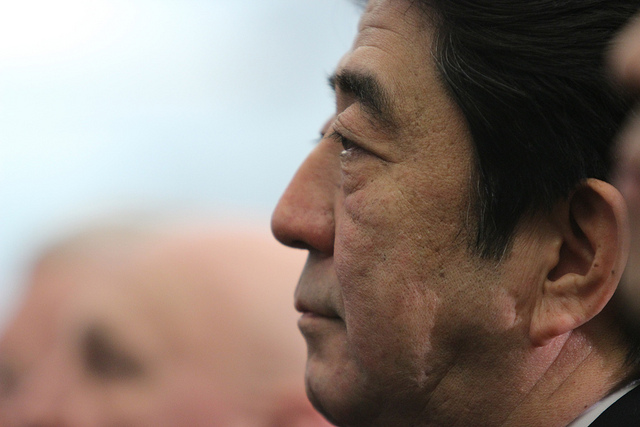For Japan’s Premier Shinzō Abe, Abenomics, a three point economic strategy to revive Japan, will be the first task he has to attend to after his landslide victory in the Lower House election was announced on Monday this week.
Abe’s conservative Liberal Democratic Party (LDP) and New Kōmeitō Party, its junior ruling coalition member, swept the election by winning 326, a whopping two-thirds of the 475 seats, recording a low voter turnout nonetheless.
Despite winning the election by a landslide, only 52.66 percent of the population was recorded at the polling turnout. This is 6.66 points down from the previous election in 2012 which saw the LDP return to power ending rival Democratic Party of Japan’s first term in power. Political analysts noted that a lack of strong opposition parties, not support for Abe won him this election.
At the conference in the LDP headquarters in Tokyo, a triumphant Abe said, “We will keep prioritizing the economic agenda. We will spread (the benefits) of economic recovery to all across the country.” In order to boost Japan’s potential for growth in the future, Abenomics, the three “arrow” economic policy of more fiscal spending, structural reforms and aggressive monetary easing is what Abe promised to pursue as he announced his victory at the press conference on Monday afternoon.
The landslide victory for Abe, is an indication of the presence of few rivals internally that will challenge him at the LDP’s presidential election next year. For Abe, who has led the country as its prime minster since his second win in 2012, this win is an augury of his possible third term as the island nation’s returning leader.
The National Diet or Kokkai, Japan’s bicameral legislature is expected to hold a special session on Dec. 24 re-electing Abe for his third term, following which he will have to choose his new Cabinet. The public broadcasting network Nippon Hōsō Kyōkai (NHK) reports that Abe intends to retain his Cabinet as is, although he made no comments on it, only deferring it to the future when pressed about the issue.
In his argument on Sunday, Abe believed that re-electing his coalition meant that voters endorsed his security policies for Japan, even though they are linked to a somewhat controversial reinterpretation of the pacifist Constitution. A long-held ambition, Abe is likely to call a national referendum on revising the Constitution, although it is in his best interest to tread softly on the issue. For his part, the premier pledged to enact the right of collective self-defence in the Diet session in January saying, “Of course voters gave support (to the planned security bills). We will carry out what we have promised.”
After an independent candidate joined the LDP late on Sunday, the total count came to 291 while the New Kōmeitō recorded 35 seats, and the others made up the rest. The next challenge for Shinzō Abe, will be the Upper House election in summer 2016, a move that will aid Abe in his quest to pursue amendments in the Constitution although, the charter has to be initiated by a two-thirds majority vote in both the Lower and Upper houses, before it is given the stamp of public approval in a national referendum.
Analysis by Rathan Paul Harshavardan
Sources:
